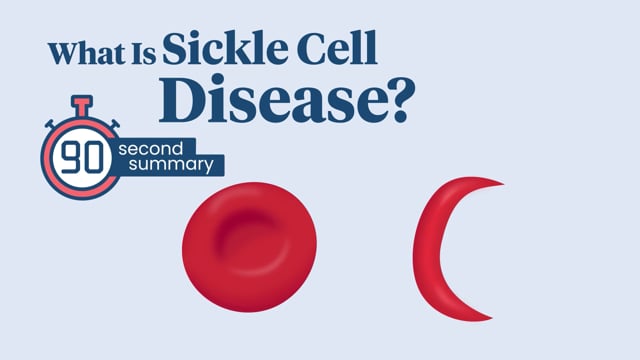Sickle Cell Disease
What Is Sickle Cell Disease?
Sickle cell disease is a health problem that makes a person's red blood cells become C-shaped or curved like a sickle instead of round. The curved cells can get stuck in and block small blood vessels. Blood can't flow normally, which can lead to pain and organ damage. People with sickle cell disease need lifelong medical care.
Sickle cell disease gets passed down in families. This means that people with sickle cell disease get it from the genes they inherited from their parents.
-

What Is Sickle Cell Disease?
Sickle cell disease causes red blood cells to be curved, or sickle shaped, instead of round. Find out what can happen and how medicine can help.
Why Do Cells Become Sickle-Shaped?
People with sickle cell disease have a different kind of hemoglobin in their red blood cells than other people. Hemoglobin (pronounced: HEE-muh-glow-bin) is the part of the red blood cells that carries oxygen. The hemoglobin in sickle cells causes the red blood cells to change from being round and flexible, to stiff and sticky.
How Does Sickle Cell Disease Affect People?
Each person with sickle cell disease has a unique experience with health problems. The most common problems are:
- A pain crisis. C-shaped red blood cells are stiff and sticky. They cause all kinds of blood cells to collect in clumps. The clumps can clog small blood vessels, so blood can’t flow easily to carry oxygen to the body. The person feels pain where they don’t get enough oxygen. It's called a pain crisis or a vaso-occlusive crisis. Things like dehydration, being too cold, or being stressed can trigger a pain crisis.
- Anemia. Sickle-shaped cells break down faster than normal red blood cells. There may be too few red blood cells around to do their job. This is called anemia. A person with anemia feels tired and has less energy.
Sickle cell blockages can also cause damage to organs, like the eyes, bones, or kidneys. If a blockage hurts the lungs or the brain, it can be serious. A person needs to get to the hospital right away. Fortunately, treatments are available that can help prevent problems from sickle cell disease.
How Is Sickle Cell Disease Treated?
Treatments have different goals. Some treatments:
- Keep a person healthy. There are different kinds of medicines for sickle cell disease. Some keep red blood cells round and plump. Others prevent cells from clumping together or breaking down so they can carry oxygen more easily.
- Make a problem get better. A blood transfusion adds more healthy blood cells, which can help anemia. Pain medicine can relieve pain during a pain crisis.
- Cure the disease. A stem cell transplant can cure some kinds of sickle cell disease. Someday, gene therapy may become another cure.
How Can People With Sickle Cell Disease Stay Healthy?
If you have sickle cell disease, here are some tips:
- Get vaccinated. People with sickle cell disease can get sicker from some illnesses than other people. Your doctor can tell you which vaccines you need.
- Take medicines exactly as your doctor recommends.
- Take care of yourself. Eat well. Get rest. Drink plenty of water. Avoid smoking, vaping, alcohol, and drugs, which can trigger problems from sickle cell.
- Dress in layers to avoid getting too hot or too cold.
- Avoid your “triggers,” the things that lead pain. Try to figure out if your triggers include hot or cold temperatures, not drinking enough water, stress, or something else.
- Speak up. If you don’t feel well, tell an adult right away. Don’t wait until the end of class or sports practice. Early help may prevent a small problem from turning into a big one.
- Stay in touch with your care team. Go to all your doctor’s visits. Tell the care team how you’re doing. Ask questions. Together you’ll work toward the goal of feeling well.
